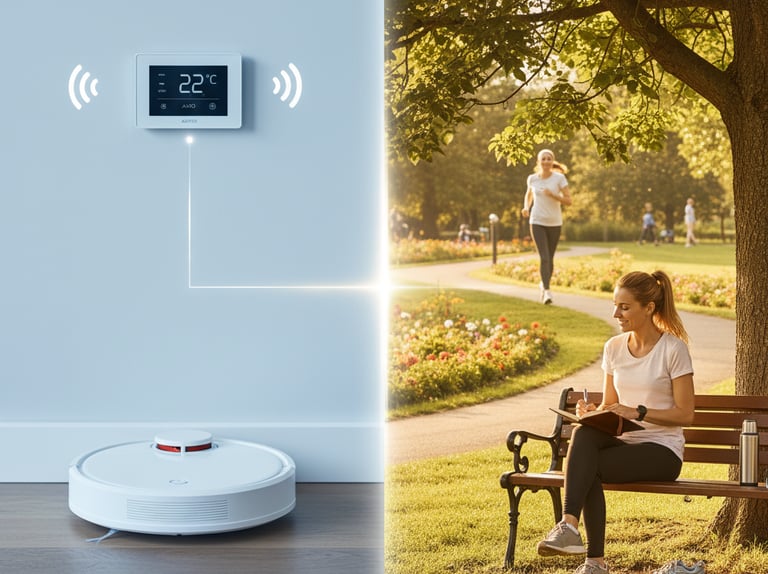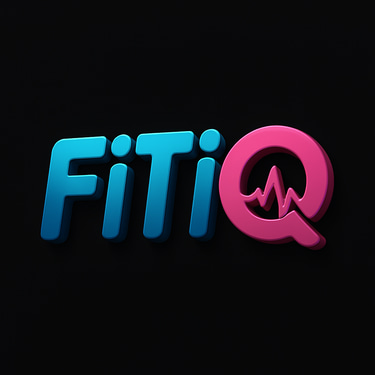"I Survived. I Lived. Then I Woke Up."
Smart Devices Giving you Back time
From robot vacuums to AI schedulers, automation is shaving time off chores and calendar chaos—opening real space for fitness, learning, and mental reset. Here’s what actually works, what’s new, and how to use it wisely.
Christopher J
9/14/20253 min read


The dream of “set it and forget it” is no longer sci-fi; it’s Tuesday. Americans spend about two hours a day on household activities like cooking, cleaning, laundry, and home management. Even small time wins here add up fast. Automate 15–30 minutes and you’ve carved out a daily slot for a workout, a course, or actual breathing—the underrated kind that involves lungs instead of notifications. Bureau of Labor Statistics
What’s doing the time-theft reversal? Three big buckets: home devices that handle the repetitive stuff, AI that defuses scheduling chaos, and standards that finally make devices play nice.
Robot hands (and wheels) for routine chores
Robot vacuums are the poster children for “work while you’re away.” They’re not magic elves, but evidence suggests they trim cleaning time—modestly, yet measurably. One study found automatic vacuums reduced cleaning time by roughly 1–2%, a small edge that compounds when scheduled daily or paired with mop modules. Think of it like passive income…for crumbs. ScienceDirect
Smart thermostats are another stealth time (and energy) saver. They learn habits and set temperature setbacks automatically. The U.S. Department of Energy notes that simply setting your thermostat back 7–10°F for 8 hours a day can save around 10% a year on heating and cooling—precisely the kind of “invisible” automation that pays you back without micromanagement. The Department of Energy's Energy.gov
Voice assistants and smart speakers are now mainstream remotes for life. About 35% of Americans own a smart speaker (roughly 101 million people ages 12+), which means a huge chunk of households can already run lights, timers, reminders, and shopping lists by voice while their hands are busy with, well, life. Edison Research
AI that tames your calendar (and your brain)
Scheduling is household admin in disguise, and AI is getting scarily competent at it. In Outlook, Microsoft’s Copilot can schedule focus time or 1:1s, scan calendars for the best slot, and even draft an agenda—no tab-juggling required. TECHCOMMUNITY.MICROSOFT.COM+1 Google’s Gemini can create, find, and edit calendar events, and its newer “scheduled actions” can automate recurring tasks like daily summaries—so the assistant remembers to remember. Google Help+2The Verge+2
This matters (pun fully intended) because time affluence—the feeling that you have enough time—is strongly tied to happiness and well-being. As Harvard’s Ashley Whillans has put it, “Time affluence…can promote happiness,” and people who value time over money often report lower stress. Automation can’t create hours, but it can change how your hours feel. The Harvard Crimson
Finally fixing the “why won’t this connect?” problem
Smart homes used to be an escape room puzzle with worse lighting. The Matter standard is changing that by making devices from Apple, Amazon, Google, Samsung, and others speak the same language. Recent releases have focused on energy reporting, major appliances, and—importantly for your sanity—easier setup with NFC tap-to-pair and multi-device QR codes. Incremental? Yes. But fewer pairing headaches means you’ll actually use the automations you set up. CSA-IOT+1
How to get the most time back (without getting creepy)
Pick one chore and fully automate it. A robot vacuum that runs daily at 10 a.m. while you’re out is better than three gadgets you babysit.
Bundle automations around transitions. Have lights, thermostat, and music scene “Leave Home” trigger together. Less fiddling, more flow.
Automate the admin of habits, not the habits themselves. Use AI to block focus time and auto-schedule workouts; you still do the push-ups.
Check privacy labels before you connect everything. Mozilla’s “Privacy Not Included” guide is a great gut-check on which devices behave like helpful roommates and which behave like gossipy doorbells. Mozilla Foundation+1
Reality check: automation isn’t a cure-all
Early adopters know smart gear can still be glitchy. Matter’s 2025 updates lean into reliability, but adoption across brands takes time. If a device goes rogue, simplify: fewer platforms, better routers, and hardwired hubs can help. Progress is real—perfect is not. The Verge+1
Where the “found time” goes is the whole point
Automation is only as good as the life it makes room for. In my own recovery journey, tiny, repeatable routines were the scaffolding—consistent sleep, short daily movement, five minutes of journaling. Smart automations created frictionless pockets for those non-negotiables. Research backs the vibe: small acts that increase your sense of time control can reduce stress and boost well-being. Bonus twist—spending some of that time helping others can make you feel even more “time rich.” PubMed+1
Call to action
Try a one-week experiment: automate one chore (vacuuming or laundry reminders), one energy saver (thermostat setbacks), and one calendar routine (daily focus block). Use the reclaimed 30–60 minutes for a brisk walk, a skill practice, or quiet reflection. Your future self—and your nervous system—will thank you. Keep an eye on updates to Gemini, Copilot, and Matter through the year; the less time you spend managing tech, the more you’ll spend actually living.

Do you have a life changing story and want to help others with your experience and inspiration. Please DM me or Send me an email at the links below
Contact Me
© 2025. All rights reserved.
Privacy Policy
